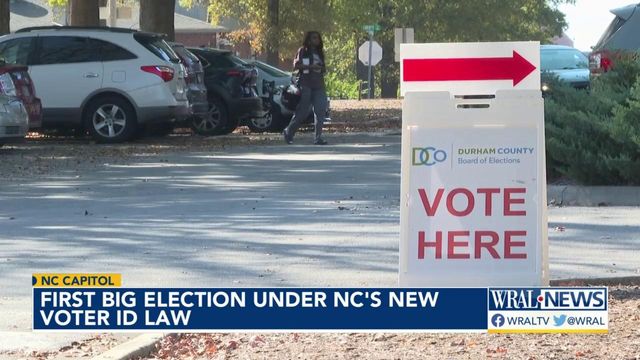NAACP, state lawmakers jostle over voter ID trial date as 2024 election looms closer
Republican state lawmakers and the North Carolina NAACP argued in federal court Tuesday over when to put on trial the state’s new rules requiring voters to show photo identification before casting a ballot at the polls.
The judge overseeing the case, Federal District Court Judge Loretta Biggs, didn't immediately make a decision on when to hold the trial following Tuesday's hearing. It's unclear when she might issue her ruling.
The timing of the trial matters because of the impending 2024 elections. Voter ID is allowed for now. So the longer a trial is delayed, the greater the chance that voter ID will be used in 2024 even if it's later ruled unconstitutional.
The arguments come as North Carolina once again figures to be a presidential swing state in 2024. Voters will also elect a new governor, lieutenant governor, attorney general and more.
Delays are common in federal courts — the lawsuit has already dragged on for five years; the NAACP filed this lawsuit the day after the law passed in late 2018 — but with next year's presidential election fast approaching, opponents of voter ID are pushing to go to trial sooner rather than later.
The NAACP wants to have the trial in February. If they win and succeed in convincing the judge that the new voter ID law is unconstitutional, that would likely give more than enough time to block voter ID from being used in next year’s general election — and possibly in the primary election, too.
They’ve argued that, much like an earlier version of the law that was struck down for intentional racial discrimination, the newest voter ID law will disproportionately harm non-white voters.
“Setting a trial date in early 2024 will allow the court to issue a decision on this matter well before the 2024 general election, clarifying the requirements for voting sufficiently in advance to allow for voter education, as well as the preparation of election materials and training of election workers,” the NAACP wrote in asking for the February trial.
Republican leaders who support voter ID want to delay the trial indefinitely, writing in opposition to the NAACP’s request that “it is far too soon to set a trial date.”
Officially the legislature’s argument is that because this case has been bouncing around in the courts for years now, there are too many side issues and disputes that have yet to be resolved and need to be wrapped up before trial.
The longer a trial is delayed, the more likely it is that voter ID is required in the 2024 elections even if it's ruled unconstitutional. The judge hearing the case, Biggs, has already once ruled against the legislature on the issue of voter ID, back in 2019. Her 2019 ruling was overturned on appeal, in a unanimous decision by the 4th Circuit Court of Appeals, sending the case back to where it stands now.
Tuesday’s hearing is over one of multiple lawsuits that had been filed to challenge the law when it first passed in late 2018. Challengers have have succeeded in holding up the rules from being used until this year.
Due to several recent GOP wins in court, voters were required to present photo identification for the first time in the 2023 municipal elections — and with few hiccups, WRAL reported. If this federal trial is pushed back, then voter identification is likely to continue to be required during the 2024 elections as well, pending any other court decisions or new lawsuits.
Republicans have been trying to implement voter ID rules for a decade now. The legislature first passed a voter ID law in 2013; it was only ever used in one primary election before being struck down as racially motivated and unconstitutional. They then made some tweaks and passed a new, less strict version in 2018. That’s the one being challenged in this ongoing lawsuit.












